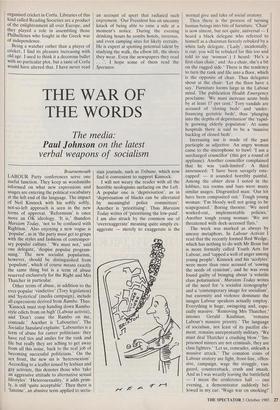THE WAR OF THE WORDS
The media:
Paul Johnson on the latest
verbal weapons of socialism
Bournemouth LABOUR Party conferences serve one useful function. They keep us wordsmiths informed on what new expressions and usages are entering the political vocabulary at the left end of the language. The impact of Neil Kinnock with his softly softly, not-so-left approach is seen in the new terms of approval. 'Reformism' is once more an OK ideology. 'It is,' thunders Marxism Today, 'not to be confused with Rightism.' Also enjoying a new vogue is `popular', as in 'the party must get to grisps with the styles and fashions of contempor- ary popular culture.' We must not,' said one delegate, 'despise popular program- ming.' The new socialist popularism, however, should be distinguished from `populism', which of course means exactly the same thing but is a term of abuse reserved exclusively for the Right and Mrs Thatcher in particular.
Other terms of abuse, in addition to the ever-popular 'vindictive' (Tory legislation) and 'hysterical' (media campaign), include all expressions derived from Rambo. Thus: `Kinnock must stop handing down Rambo- style edicts from on high' (Labour activist), and 'Don't come the Rambo on me, comrade.' Another is 'Labourites'. The Socialist Standard explains: 'Labourites is a term of abuse for career politicians: they have red ties and smiles for the rank and file but really they are aching to get away from all this noise, back to the real job of becoming successful politicians.' On the sex front, the new sin is `heterosexism'. According to a leaflet issued by lesbian and gay activists, this denotes those who 'take an aggressive attitude to alternative sexual lifestyles'. 'Heterosexuality,' it adds prim- ly, is still 'quite acceptable'. Then there is `fanzine', an abusive term applied to secta- rian journals, such as Tribune, which now find it convenient to support Kinnock.
I will not weary the reader with all the horrible neologisms surfacing on the Left. A popular one is `deprivisation', as in `deprivisation of blacks can be alleviated by meaningful police committees'. Another is 'prioritising'. Thus Marxism Today writes of 'prioritising the low-paid'. I am also struck by the common use of `overexaggerate' meaning quite simply ex- aggerate — merely to exaggerate is the normal give and take of social oratory.
Then there is the process of turning human beings into bits of furniture. 'Chair' is now almost, but not quite, universal — I heard a black delegate who referred to himself as a chairman fiercely rebuked by a white lady delegate. (`Lady', incidentally, is out: you will be rebuked for this too and told to say `woman'.) I heard: 'He's a first-class chair,' and 'As a chair, she's a bit on the rugged side.' There is the tendency to turn the rank and file into a floor, which is the opposite of chair. Thus delegates shout at the chair: 'Let the floor have a say.' Furniture looms large in the Labour mind. The publication Health Emergency proclaims: 'We must increase acute beds by at least 17 per cent.' Tory vandals are accused of 'closing beds' and 'under- financing geriatric beds', thus 'plunging into the depths of deprivisation' the 'rapid- ly growing elderly populaton'. At some hospitals there is said to be a 'massive backlog of closed beds'.
Increasing use is made of the past participle as adjective. An angry woman came to the microphone to bawl: 'I am a surcharged councillor' (this got a round of applause). Another councillor complained that he was 'cash-limited'. A third announced: 'I have been savagely rate- capped' — it sounded horribly painful. Among the obiter dicta I noted in the lobbies, tea rooms and bars were many similar usages. Disgruntled man: 'Our lot have been composited out.' Tough young woman: 'I'm bloody well not going to be scapegoated.' Boring theorist: 'We need worked-out, implementable policies.' Another tough young woman: 'We are threatened with deck-accessed flats.'
The week was marked as always by uneasy metaphors. In Labour Activist I read that the recently formed Red Wedge, which has nothing to do with Mr Benn but is more formally called Youth Arts for Labour, and 'tapped a well of anger among young people'. Kinnock and his 'acolytes' were more than once accused of 'sowing the seeds of cynicism', and he was even found guilty of bringing about 'a volatile class polarisation'. Marxism Today writes of the need for 'a socialist iconography' and a 'contemporary image for socialism', but enormity and violence dominate the images Labour speakers actually employ. Everything is huge, swingeing and, espe- cially massive. 'Removing Mrs Thatcher,' intones Gerald Kaufman, 'remains Labour's massive priority.' The language of socialism, not least of its pacifist ele- ment, remains unrepentantly military. 'We must deal Thatcher a crushing blow.' Im- prisoned miners are not criminals, they are class fighters.' Let us, comrades, unleash a massive attack.' The common coins of Labour oratory are fight, front-line, offen- sive, campaign, wage the struggle, van- guard, counterattack, crush and smash. And as I was wearily leaving the battlefield — I mean the conference hall — one evening, a demonstrator suddenly bel- lowed in my ear: 'Wage war on smoking!'


























































 Previous page
Previous page